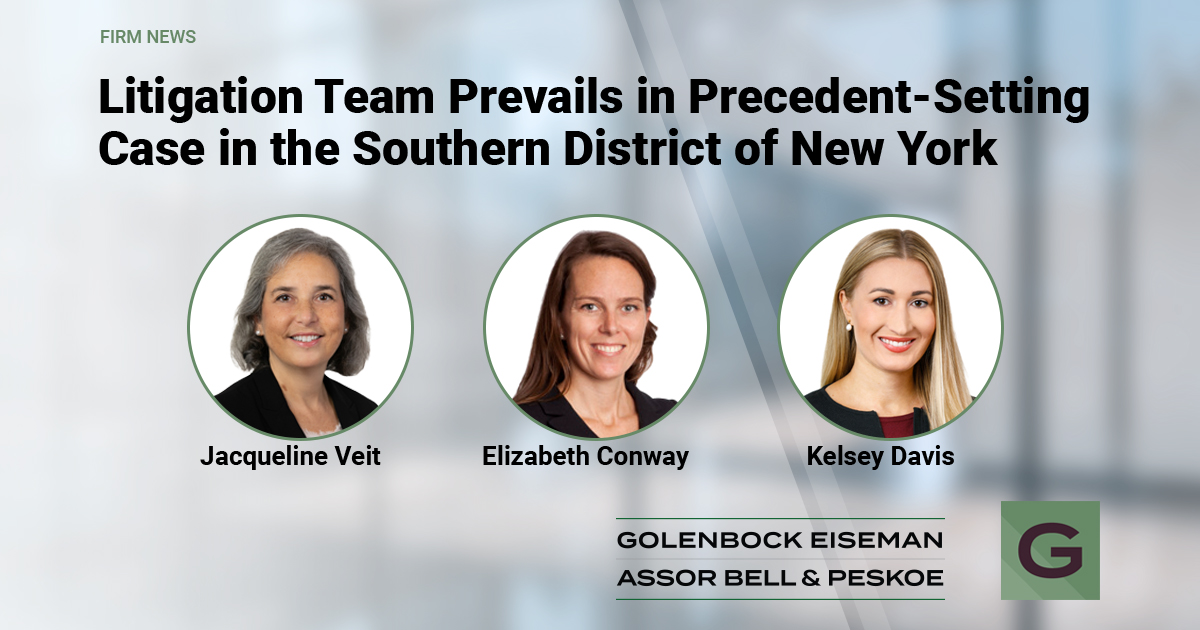A Golenbock Eiseman Assor Bell & Peskoe LLP litigation team — partners Jackie Veit and Beth Conway and associate Kelsey Davis — won a jury verdict following a seven-day trial on behalf of client Ruby Has, an e-commerce fulfillment company, in its nearly 3-year-long dispute with private equity firm Cambridge Capital. The defense verdict, returned on August 15, 2023 following a trial before Judge Lewis J. Liman of the U.S. District Court for the Southern District of New York, and entered by the Court on September 6, followed a successful earlier decision on a motion for partial summary judgment issued on June 2, 2023, which struck much of Cambridge Capital’s case by rejecting its claim for $30 million in expectation damages.
The case has important implications for the private equity industry and others engaged in transactional activity commencing with the execution of non-binding term sheets or letters of intent.
The case sets limits on the reach of a 2013 case from the highest court in Delaware that made potential deal partners, private equity firms and their corporate targets fear what is commonplace in the business world – the non-binding letter of intent (“LOI”). In the earlier case, SIGA Technologies, Inc. v. PharmAthene, Inc., 67 A.3d 330 (Del. 2013), the Delaware Supreme Court ruled that a company that signed a non-binding term sheet for a license agreement, which was later referenced in other agreements between the parties, was entitled to “expectation damages,” that is, lost profits calculated off what the licensee would have made had the contemplated license gone through. The language used by the SIGA court was very broad, and transactional lawyers and their clients, ever since, have feared the implications of the SIGA case and its broad reach, extending to even expressly non-binding letters of intent signed in initial deal talks.
The new Ruby Has case may set some nervous executives’ minds at ease. The case arose from a non-binding LOI for the potential acquisition of 51 percent of Ruby Has by private equity firm Cambridge Capital. After months of negotiations, the deal collapsed. Relying on SIGA, Cambridge sued, claiming that the target company demanded more money and thereby breached an implied “duty to negotiate in good faith” arising from the LOI, and that Cambridge had suffered tens of millions of dollars of damages from that breach in losing the investment opportunity.
In a lengthy decision issued by Judge Liman on June 2, 2023 (2023 WL 3956868), the court granted Ruby Has’s motion for partial summary judgment. First, the court rejected Cambridge’s claim for expectation damages, holding that they were not recoverable in this case despite the SIGA precedent. In so doing (in addition to two other grounds for striking expectation damages), the court distinguished Ruby Has’s situation from that in SIGA, finding that the Delaware Supreme Court granted expectation damages under Delaware law only in a narrow context in which such damages were foreseeable. The Court also threw out Cambridge’s claim of breach of an exclusivity provision in the LOI, which was alleged as another breach of the claimed duty to negotiate in good faith.
The case proceeded to trial seeking minimal damages. At trial, the jury found that no “duty to negotiate in good faith” existed in this LOI and found for the defense without having to consider any other arguments. The jury agreed with Golenbock’s lawyers that “non-binding” means exactly that—non-binding — and found that there cannot be any hidden meaning within a non-binding LOI to bind a target company or an acquirer to a potential deal that both sides are free to walk away from for any reason.
Both private equity firms and potential sellers should have confidence that they can explore a potential acquisition intensely, without making a commitment to complete the acquisition, and without fear that this ‘good faith duty’ cause of action could undermine their intentions. In fact, the very purpose of a non-binding LOI is to explore the potential transaction being considered. The system works much better when each side has the freedom to study the other, and negotiate deal terms in a way that allows them to take into account changing circumstances facing their businesses during the course of negotiations.
The limitation on the reach of SIGA in the Ruby Has case is an important positive development for M&A and private equity transactions. We are proud of the results in this case for our client, and in helping to create key precedent that is consistent with industry practice.
For more information on Letters of Intent in corporate transactions and to be alerted to informational programs on deal-making, click here.
Golenbock Eiseman Assor Bell & Peskoe LLP
Golenbock Eiseman Assor Bell & Peskoe LLP, a full-service Manhattan-based business law firm, serves clients’ complex litigation, corporate, reorganization, intellectual property, real estate, tax, and trust & estate needs. The firm takes pride in its sophistication, experience, and ability to take on major engagements for its domestic and international clients while also maintaining a hands-on, personalized approach to all matters.
Golenbock represents entrepreneurial, portfolio, and institutional clients, ranging from start-ups to Fortune 500 companies, with a specific focus on the mid-market segment. Corporate clients include middle-market private corporations, public companies, private equity firms, venture capital firms, individual investors, and entrepreneurs on a global scale.
The firm’s litigation group represents clients in all aspects of litigation in state and federal courts. Corporate clients include middle-market private corporations, public companies, private equity firms, venture capital firms, individual investors, and entrepreneurs on a global scale.
Golenbock is a member of the Alliott Global Alliance, which was named Band 1 of global law firm alliances by Chambers Guides, the prestigious international legal survey. Alliott numbers 215 firms in 94 countries on six continents, and helps member firms partner with others in countries around the globe.
